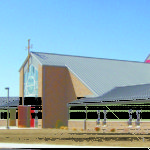
In a recent Advent reflection, Sister of Mercy Doris Gottemoeller compares the time in which Jesus was born to our present time. “First, the world into which Jesus was born was tragically divided — religiously, politically, economically. Among the Jews, competing sectors scorned one another. Roman rule over the Jews was often cruel and autocratic. And the gap between rich and poor seemed unbreachable. Today, our peoples and nations, despite enormous scientific progress, experience the same divisions, often exacerbated by the ability to insult and threaten one another using social media. And standing at the ready are weapons and armies that could destroy the planet as we know it.”
A bleak portrait to consider in this final week of Advent. However, Sister Gottemoeller offers a second observation that she says overwhelms the first: “the ‘good news of great joy is for all the people.’ God wishes ‘peace to those upon whom his favor rests’ (Luke 2:10).” Sister tells us that “God’s favor is without limit, encompassing saints and sinners (and ourselves, wherever we stand on that spectrum!).” She says God’s favor embraces:
• The infant born with terrible fetal anomalies, destined to live only a few minutes.
• The murderer on death row.
• Your favorite NFL quarterback.
• Your best friend.
• The current occupant of the White House.
• The clerk who waited on you in the supermarket.
• And everyone else on Earth, whatever their ethnicity, nationality, religion or political views.
Human dignity is the “source and bedrock of the Church’s social teaching,” Sister says. “God sent his Son as Messiah and Lord, as savior, for each and every human being … we need to remind ourselves that God’s favor rests on every person we encounter.” Read the full reflection at The Sisters of Mercy of the Americas (https://tinyurl.com/y2ne4xa3).
The relentless pandemic and equally relentless post-election drama may be distracting us from the season of Advent and our calling as people of faith to prepare the way of the Lord, beginning in our own hearts. We are fallible human beings, but also recipients of God’s mercy and forgiveness. We are called to extend God’s generous gift to family, friends, neighbors, strangers — including those with whom we vigorously disagree.
“The human heart is heavy and hardened,” the Catechism of the Catholic Church, tells us. “God must give man a new heart. Conversion is first of all a work of the grace of God who makes our hearts return to him …” (CCC No. 1432). This statement appears in the section of the Catechism on the Sacrament of Penance, a sacrament that many of us turn to during this season of Advent as part of our preparation to celebrate God becoming one of us. This year, because of the pandemic, check with your parish to see when you may receive the sacrament of penance. Another idea: reflect on the examination of conscience found on the website of St. John Vianney
Parish in Bettendorf, which chose the Lord’s Prayer (sjvbett.org/reconciliation) as its framework.
One of the stanzas reads; Forgive us our sins as we forgive those who sin against us. Have I forgiven those who offended or harmed me? Whom did I harm, and what actions have I taken to make amends? What steps remain? Do I harbor feelings of revenge or resentment?
A “Prayer at Home” Advent 2020 guide created by the Diocese of Davenport and sent to households in the diocese includes a list of intercessions that inspire us to change our hearts. Among the intercessions: “That by keeping of Advent we would grow in love of God and neighbor … That the dawning light of Christ would overcome the night of sin and division, we pray: ‘Come, Lord Jesus.’”
We can change a world that today is as tragically divided religiously, politically and economically as it was in Jesus’ time by preparing to welcome our Savior by recognizing him in everyone we encounter — in person or virtually.
Barb Arland-Fye, Editor
arland-fye@davenportdiocese.org











